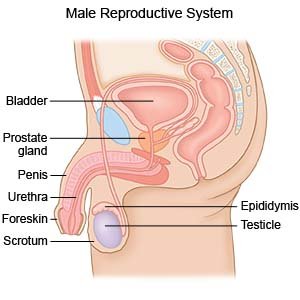Prostate Photovaporization
Medically reviewed by Drugs.com. Last updated on Sep 23, 2025.
AMBULATORY CARE:
What do I need to know about prostate photovaporization?
Prostate photovaporization (PVP) is a procedure that uses a laser to vaporize (burn away) part of the prostate gland. This can help reduce urinary problems caused by an enlarged prostate.
 |
Seek care immediately if:
- You cannot urinate, or if you have a catheter, no urine is filling the bag.
- Your catheter comes out of your urethra.
- You have lower abdominal or back pain that does not go away.
- You have redness, pain, blood, or drainage where the catheter enters your penis.
- Your urine is red, cloudy, and foul smelling.
Call your doctor if:
- You have a fever.
- You have chills, a cough, or feel weak and achy.
- Your symptoms get worse.
- You are dizzy, have nausea, or are vomiting.
- You have questions or concerns about your condition or care.
Related medications
How do I prepare for prostate PVP?
Your healthcare provider will talk to you about how to prepare for surgery. Your provider may tell you not to eat or drink anything after midnight on the day of your surgery. Your provider will tell you what medicines to take or not take on the day of your surgery.
What will happen during prostate PVP?
You may need to urinate before your procedure. You may be given medicine to keep you asleep during the procedure. Or, you may be given medicine to keep you calm and relaxed. With this medicine, you will be awake during the procedure but you will not feel pain. Your healthcare provider will insert a scope into your penis through your urethra. Your provider will insert the laser through the scope and move it to the prostate. Your provider will use the laser to vaporize the enlarged prostate tissue until the blockage is removed. You may need a catheter after the procedure to drain urine from your bladder.
What are the risks of prostate PVP?
You may have mild discomfort or burning when you urinate. You may have increased urge and frequency to urinate. There may be a small amount of blood in your urine for the first 2 weeks after the procedure. The laser may irritate or damage the tissue in and around your prostate. You may not be able to ejaculate. Semen may drain into your bladder and come out in your urine instead of through the urethra during sexual activity.
© Copyright Merative 2025 Information is for End User's use only and may not be sold, redistributed or otherwise used for commercial purposes.
The above information is an educational aid only. It is not intended as medical advice for individual conditions or treatments. Talk to your doctor, nurse or pharmacist before following any medical regimen to see if it is safe and effective for you.
Further information
Always consult your healthcare provider to ensure the information displayed on this page applies to your personal circumstances.
